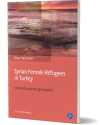 New with Budrich:
New with Budrich:
Syrian Female Refugees in Turkey. Intersectional Marginalization
by Onur Yamaner
About the book
In recent years, migration has become one of the most discussed phenomena, both within and outside the academic world. This book takes into account how Syrian female refugees are socially, economically, culturally, ethnically and sexually marginalized. Author Onur Yamaner analyzes how discourses produced in the Turkish host society affect Syrian female refugees and local women. What do these women think about the ongoing events, their status and the steps the Syrian government and NGOs as well have taken so far in order to produce solutions for women’s invisibilization in the public sphere?
Onur Yamaner’s short vita in own words
 Onur Yamaner received his Ph.D. in Sociology and Social Anthropology from the University of Valencia in 2020. He was a research fellow at Tübingen University, and a visiting scholar at the University of Marburg, during his studies. Currently, he is a visiting scholar at the Department of Anthropology, Yeditepe University, Istanbul. His major research interests focus on discourse analysis, political discourse, integration and invisibilization, women’s history, gender studies and refugee policy.
Onur Yamaner received his Ph.D. in Sociology and Social Anthropology from the University of Valencia in 2020. He was a research fellow at Tübingen University, and a visiting scholar at the University of Marburg, during his studies. Currently, he is a visiting scholar at the Department of Anthropology, Yeditepe University, Istanbul. His major research interests focus on discourse analysis, political discourse, integration and invisibilization, women’s history, gender studies and refugee policy.
Dear Mr. Yamaner, please summarize the content of your current publication Syrian Female Refugees in Turkey. Intersectional Marginalization for our readers.
The book discusses how Syrian female refugees are socially, economically, culturally, ethnically and sexually marginalized. The general objective of this book is to understand how discriminatory discourses causing the social exclusion of Syrian female refugees are shaped and (re)produced in Turkey, what the discriminatory discourses are influenced by, and what kind of an impact they have. This includes a main objective to identify the intersectionality of the discrimination and invisibilization of Syrian female refugees. A thorough investigation is made into how the discriminatory discourses are instrumentalised in the exclusion of the refugee community as a whole are constructed and their political, social, and economic periphery. I establish three different sets of data, which are fieldwork, social media, and written media analysis. These give the opportunity to compare, assess, and examine the discourses produced on multiple platforms.
How did you get the idea to write this book?
In my previous works, I have focused on the social status of woman before, during and after World War I & II. Thinking of extremely drastic changes and milestone in people’s lives, especially from a gender perspective, has always captured my attention. I have also edited three books on the relationship between war & woman and discourses used in war times & woman. However, this time the field and the topic came to me. With the Syrian Civil War, I, as a social researcher living in Turkey, have become a witness of migration which is one of the most discussed phenomena in recent years. So, I have decided to write about what I mostly see in refugee communities, suffering from invisibilization.
From your perspective, what are currently the greatest challenges for doing research on the marginalization of Syrian female refugees in Turkey?
There are several difficulties while doing research on the marginalization of Syrian female refugees in Turkey. However, the most critical and comprehensive challenge is the identity of the researcher and researcher’s position. My identity itself as a “Turkish” “male” researcher coming from the middle class was the greatest challenge for me to conduct the field research because of the gender norms of the refugee society.
(How) Do you think these challenges will change in the coming years?
Such gender-based difficulties that I have faced in the field, do not seem to disappear in the near future as they are deeply based on rigid social norms and power relations between subject and object within the refugee society.
This is why I am author with Barbara Budrich
Barbara Budrich is an extremely professional publishing house to work with. This makes the author feel so safe. The affirmative approaches and well-programmed timetable of the editorial board is helpful for the entire process.
Order now via Budrich webshop

Onur Yamaner
Syrian Female Refugees in Turkey. Intersectional Marginalization
© header image: Sketchify <https://www.canva.com/p/sketchify/>
created with canva.com <https://www.canva.com/>

